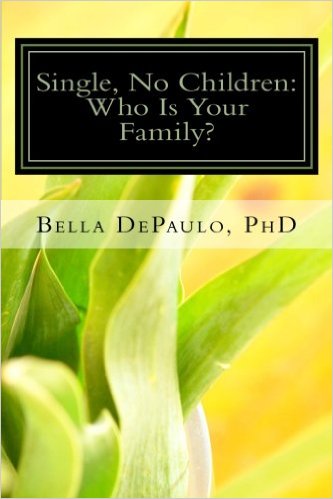
While many might be tempted to dismiss single people with no children as having no family at all, renowned singles expert Professor DePaulo does not. She instead provides a powerful case for the important role of single people in holding families together, creating new kinds of families, and coming up with innovative ways to live.
This brief book includes new writings as well as articles previously published in publications such as Time magazine. There are five chapters:
The book was just published in English so no information is available yet about sales.
After his election in 2008, President Barack Obama nominated a single woman with no children, Janet Napolitano, to be the Secretary of Homeland Security. Commenting on Napolitano’s qualifications, Pennsylvania Governor Ed Rendell declared her to be “perfect” – “because for that job, you have to have no life. Janet has no family. Perfect. She can devote, literally, 19-20 hours a day to it” (Collins, 2008).
About a year into her time as Homeland Security director, Napolitano was called early in the morning when a passenger on a flight headed to Detroit, Michigan turned out to have a bomb concealed in his underwear. It was Christmas Day, 2009, and the director was at the home of her brother (Kornblut, 2010).
Yet neither Napolitano’s brother nor her sister seem to come to mind when people such as Ed Rendell think about Janet Napolitano’s life. There are shorthand words and phrases used to refer to single people with no children – they are “alone,” they “don’t have anyone” (DePaulo, 2006). Those ways of thinking and speaking render invisible all of the important people in the lives of singles with no children, including their family and their friends (DePaulo, 2011b).
In this chapter, I will draw from the available research literature to show that single people with no children have families and do family-type things. They have personal communities that typically include friends and relatives. They have “social convoys” that provide shared experiences, continuity, and a sense of identity. Singles with no children are in some ways even more interconnected with other people such as friends, siblings, parents, and neighbors than are individuals who are married. Perceptions of who counts as family have not kept up with the realities of how people actually live their lives.
| Language | Status |
|---|---|
|
French
|
Already translated.
Translated by Nathalie CAILTEUX
|
|
Italian
|
Already translated.
Translated by Giulia Mastrantoni
|
|
Portuguese
|
Already translated.
Translated by Mariana Eunice Alves de Almeida
|
|
Spanish
|
Already translated.
Translated by Marisoly Álvarez Scarpitta
|